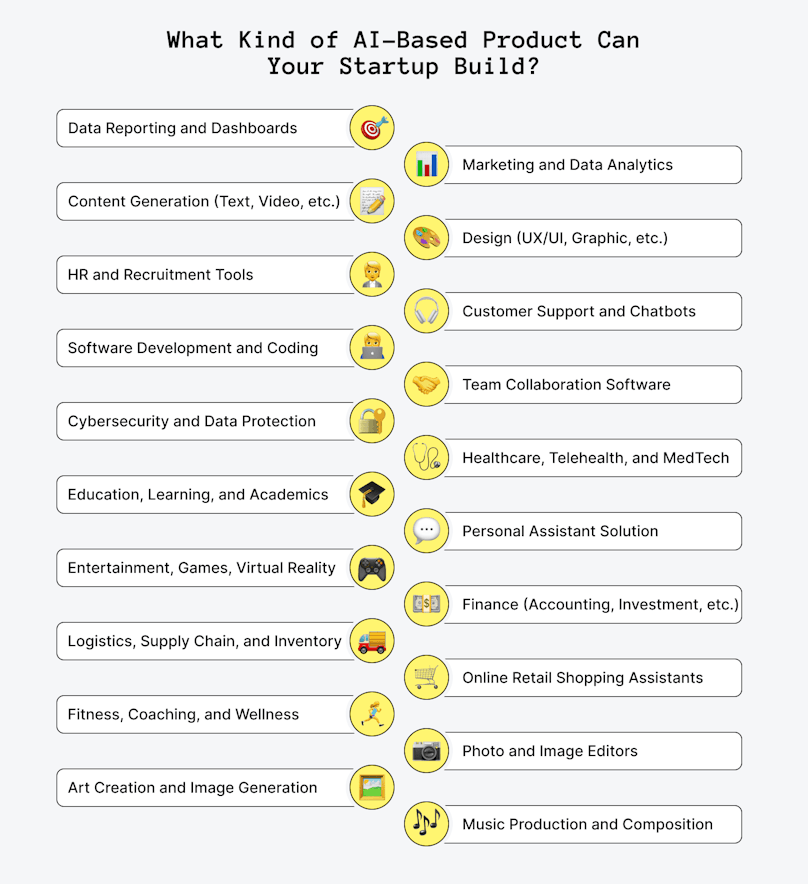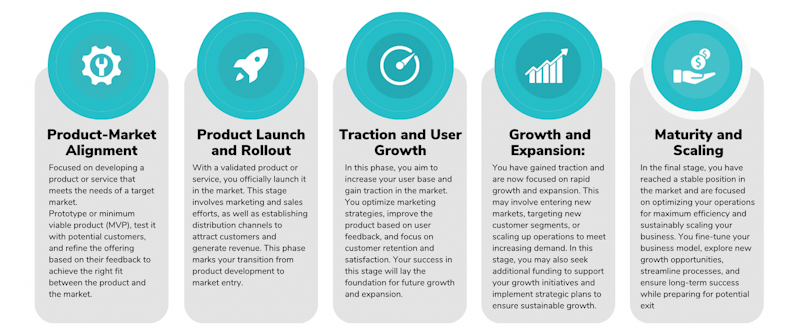Introduction to AI for Entrepreneurs
Welcome to the future, where artificial intelligence (AI) has become the pillar of innovation, particularly within startup ecosystems. This trend or vision isn't passing; it is now shaping how startups design and execute their business models. AI's vast capabilities offer us a powerful means of solving difficult problems, automating intricate processes, and providing exceptional customer experiences.
As we navigate this transitional period, AI won't determine the future of startups--it will merely unleash their full potential to help create your success story. Aspiring startup founders or CEOs can use this insight to better harness AI's potential to fuel their own success stories. Integrating AI into your startup ideas might seem daunting at first, but with the appropriate mindset and approach it can open doors to unimagined opportunities and innovations. Let's embark together on this thrilling voyage and uncover how Artificial Intelligence (AI) can serve as the cornerstone of your startup's growth and success.
Welcome the AI revolution as your company takes advantage of it to go from vision to reality - setting the scene for an incredible future where technology converges with human creativity to form magical magic!
Understanding AI and Its Potential for Startups
Artificial intelligence (AI) has opened up new possibilities for innovation and expansion for startups. Understanding its meaning and implications is paramount if an entrepreneur wishes to navigate this transformative landscape successfully.
Demystifying Artificial Intelligence
What is AI? Artificial Intelligence or AI for short, involves creating computer systems capable of performing tasks typically associated with human intelligence such as learning from data (Machine learning), understanding human language (natural language processing), recognizing patterns and images (computer vision), making decisions, etc.
The Evolution of AI: Understand how artificial intelligence has progressed from its conceptual roots to today's sophisticated applications, which may provide you with insight into how you might implement and utilize AI technology within your startup. Understanding its history can give you inspiration on how AI may shape its future use within it.
The Transformative Power of AI for Startups
Automating Operations: AI can assist businesses by automating routine tasks ranging from data entry to complex decision-making processes - freeing up valuable human resources for more strategic activities.
Enhancing Customer Experiences: Customization is at the core of today's market, and AI excels at offering tailored experiences to users - from product recommendations to dynamic customer service interactions.
Innovation Products and Services: AI can open up new avenues for product and service innovation, enabling startups to offer novel solutions that address changing customer demands.
AI as a Competitive Advantage
Staying Ahead of the Curve: In today's fast-paced startup ecosystem, using AI as a competitive advantage can give your company a major edge, enabling faster decisions based on data and innovative solutions that set your business apart.
Cost Efficiency: Artificial intelligence can assist startups to operate more efficiently, cutting costs while increasing profitability. By automating processes and augmenting decision-making capabilities, AI can make operations run more smoothly, cutting expenses while expanding profits.
Real-World Examples of AI in Startups
Case Studies: Explore successful startups that have implemented artificial intelligence into their operations, products or services and analyze its contribution to their success as well as any lessons aspiring entrepreneurs may glean from these examples.

Finding Your AI Startup Idea
In the quest to launch a groundbreaking AI startup, the genesis of a transformative idea is paramount. This journey starts with identifying problems that are ripe for AI solutions. Let's explore strategies to unearth these potential goldmines.
Spotting Opportunities in Everyday Challenges
Analyze Current Pain Points: Look into your industry or daily life to identify inefficiencies and areas where current solutions fall short. AI can offer smarter, faster, and more personalized alternatives.
Leverage AI for Social Good: Consider societal challenges—healthcare, education, environmental sustainability—that can benefit from AI's predictive analytics and data processing capabilities.
Innovate in Customer Experience: Businesses constantly seek ways to enhance customer interaction. AI can personalize user experiences, from tailored recommendations to automated support.
Tapping Into Emerging Trends
Stay Ahead with Tech Advancements: AI is a rapidly evolving field. Keeping abreast of the latest developments in machine learning, natural language processing, and robotics can inspire innovative applications.
Market Needs and Consumer Behavior: Use AI to analyze market trends and consumer data, revealing unmet needs that your startup could address.
Real-life Examples to Ignite Your Imagination
Healthcare Diagnostics: AI startups like PathAI are revolutionizing how medical diagnoses are made, using AI to analyze pathology slides more accurately and swiftly than humans.
Educational Tools: Companies like Duolingo use AI to create personalized learning experiences, adapting to each user's learning style for more effective language acquisition.
Sustainable Solutions: Startups like Gro Intelligence are leveraging AI to tackle climate change, analyzing data to predict agricultural trends and enhance food security.
By merging your passion with AI's potential, you can uncover ideas that not only promise commercial success but also contribute to societal well-being. The key is to approach problems with an AI-first mindset, asking not if AI can be applied, but how AI can transform the solution landscape. As you embark on this exploratory phase, remember that the best AI startup ideas often stem from a deep understanding of both technology and the human condition. Your aim should be to find that sweet spot where innovation meets need, technology meets empathy, and your startup idea meets the future head-on.
Validating Your AI Startup Idea
Validation is a crucial step in the entrepreneurial journey, ensuring that your AI startup idea has real market potential. Let's dive into effective strategies for validating your AI startup idea, ensuring it's not just innovative but also viable.
Engage with Your Target Market
Surveys and Feedback: Directly engage potential customers through surveys or interviews. Their feedback can provide invaluable insights into the market demand and refinements needed for your AI solution.
Prototype Testing: Develop a minimal viable product (MVP) or prototype of your AI solution. Allow early users to test it and gather feedback on its usability, functionality, and overall value.
Market Analysis and Competitive Landscape
Utilize AI Market Research Tools: Tools like those mentioned in "AI Market Research Tools" can analyze trends, demand, and competition. This data is crucial for understanding where your AI startup fits within the existing market landscape.
Competitor Analysis: Identify direct and indirect competitors. Analyze their offerings, strengths, weaknesses, and customer reviews. This will help you find your competitive edge and potential market gaps you can fill.
Proof of Concept and Feasibility
Technical Feasibility: Assess whether the current state of AI technology can support your startup idea. Consider both the capabilities and limitations of AI in your intended application.
Business Model Validation: Ensure that your startup idea can be monetized effectively. Explore different revenue models and conduct financial projections to validate the business aspect of your AI solution.
Iterative Development and User Feedback
Build-Measure-Learn Loop: Adopt an iterative development approach. Use the feedback from your MVP testing to refine and improve your AI solution continuously.
Pilot Programs: Partner with potential clients or businesses to run pilot programs. These can provide deeper insights into how your AI solution performs in real-world scenarios and its impact on users.
By thoroughly validating your AI startup idea, you not only enhance its chances of success but also build a solid foundation for future development. This process is about more than just affirming the need for your solution; it's about engaging with your future customers, understanding their needs, and adjusting your vision to serve them better. Remember, the goal is to launch an AI startup that is not only technologically innovative but also deeply rooted in solving real, tangible problems for its users.
Building Your AI Solution
Transforming your AI startup idea into a tangible product is a journey filled with challenges and opportunities. This process involves several key steps, from initial design to final deployment, each critical for the success of your solution.
Designing Your AI Solution
Identifying Core Features: Begin by defining the core features that will deliver the most value to your users. Focus on solving a specific problem or addressing a particular need with AI.
User-Centric Design: Design your solution with the user in mind. How will they interact with your AI? Ensuring a seamless and intuitive user experience is crucial for adoption and success.
Developing Your AI Model
Selecting the Right Tools: Utilize the "Top 20+ AI Tools Every Startup Business Must Have" to choose the right development tools and platforms. These resources can significantly streamline the development process.
Data Collection and Processing: Gather and prepare the data your AI model will learn from. This step is foundational, as the quality and quantity of data directly impact your model's performance.
Model Training and Testing: Develop and train your AI model using the processed data. Iteratively test and refine the model to improve its accuracy and reliability.
Deployment and Iteration
Deploying Your Solution: Once satisfied with your AI model's performance, deploy your solution to your target audience. Ensure that the deployment process is smooth and that the solution integrates seamlessly with existing systems or workflows.
Continuous Improvement: AI solutions require ongoing training and refinement. Collect user feedback and performance data to continuously improve your solution. Stay updated with the latest AI advancements to enhance your product over time.
Overcoming Development Challenges
Technical Hurdles: AI development can present technical challenges, including data quality issues, model complexity, and integration difficulties. Address these challenges head-on with a skilled development team and a willingness to iterate.
User Adoption: Convincing users to adopt your AI solution can be challenging. Focus on clearly communicating the benefits and providing robust support to ease the transition.
Building an AI solution is a dynamic and iterative process that requires a deep understanding of both the technology and your target users. By focusing on design, development, and continuous improvement, you can create an AI product that not only meets the needs of your audience but also positions your startup for long-term success in the competitive tech landscape.
Marketing and Scaling Your AI Startup
Once your AI solution is ready, the next crucial steps are to market it effectively and prepare for scaling. This phase is vital for gaining traction, attracting customers, and eventually expanding your startup's reach.
Crafting a Compelling Value Proposition
Highlight AI Benefits: Clearly articulate how your AI solution solves a problem or enhances your customers' lives. Focus on the unique benefits and innovations that set your product apart from competitors.
Targeted Messaging: Tailor your marketing messages to resonate with your specific audience segments. Understanding your customers' needs and preferences allows for more effective communication.
Leveraging Digital Marketing Strategies
SEO for Visibility: Implement SEO best practices to improve your online visibility. The guide "How to use ChatGPT for SEO: Complete Guide For AI Beginners" can provide actionable tips to optimize your content and attract organic traffic.
Content Marketing: Create engaging, informative content that showcases your AI solution's capabilities and benefits. Blog posts, case studies, and videos can help educate your audience and build trust.
Social Media Engagement: Use social media platforms to connect with your audience, share valuable content, and promote your AI solution. Engaging with your community can foster loyalty and word-of-mouth marketing.
Preparing for Growth and Expansion
Scalability Planning: Ensure your infrastructure and operations can handle increased demand. Consider cloud solutions and scalable technologies that can grow with your startup.
Expanding Your Offerings: As your startup matures, explore opportunities to expand your product line or enhance existing features. Continuous innovation is key to staying relevant and competitive.
Entering New Markets: Research and plan for geographic expansion or targeting new industry segments. Understand the unique needs and challenges of these markets before diving in.
Navigating Challenges in Scaling
Resource Management: Balancing the need for growth with the available resources can be challenging. Effective planning and prioritization are essential to manage your startup's resources wisely.
Maintaining Quality: As you scale, ensuring the consistent quality of your AI solution and customer support can become more challenging. Implement robust quality assurance processes and maintain a customer-centric focus.
Marketing and scaling an AI startup requires a strategic approach that combines clear communication, effective digital marketing, and meticulous planning for growth. By crafting a compelling value proposition, leveraging SEO and content marketing, and planning for scalability, your startup can not only attract but also retain customers, paving the way for long-term success and expansion.

Conclusion: Embracing AI for Future Success
The journey through conceptualizing, validating, building, and scaling an AI startup is both exhilarating and challenging. It embodies the spirit of innovation, the pursuit of solving complex problems, and the ambition to make a significant impact. As we've navigated through each critical phase of this journey, from understanding AI's transformative potential to marketing and preparing for scalable growth, one thing remains clear: the importance of staying agile, informed, and customer-focused.
For startup founders and CEOs embarking on this AI-driven adventure, remember that success lies not just in the technology itself but in how you apply it to meet real-world needs. As you venture forward, consider how partnerships with an AI-UX Design service, can enhance your product's user experience, making your AI solution not only powerful but also intuitive and engaging for your end-users. Visit Adam Fard to discover how we can help you navigate the complexities of AI integration and design, ensuring your startup stands out in the competitive landscape.
In closing, embracing AI offers a pathway to remarkable achievements. With a clear vision, a strong value proposition, and a commitment to continuous learning and improvement, your AI startup can thrive, driving innovation and shaping the future.





